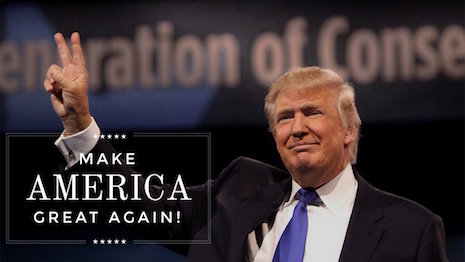- About
- Subscribe Now
- New York,
June 2, 2017

 Donald J. Trump is a divisive force among the affluent class
Donald J. Trump is a divisive force among the affluent class
The wealthiest consumers in the United States, those most likely to patronize luxury brands, are just as evenly split in opinion on the divisive new president as the rest of the country.
This data comes from YouGov’s "Affluent Perspective Global Study 2017," which looked at the perspective of affluent consumers around the world and how those perspectives affect their shopping habits. What the research found was that the affluent class in the U.S. is split almost down the middle on President Trump, and each side is firmly entrenched in their feelings.
"Our advice to brands with front-line associates is to check the politics at the door, celebrate consumers’ decisions to purchase and to deliver service with empathy and kindness," said Cara David, managing director at YouGov, New York.
The great divide
It is no secret that last year’s election was a tumultuous one.
Between allegations of foreign interference, constant controversies and a truly unusual candidate, President Trump has become one of the most divisive presidents in modern memory, maintaining a historically low approval rating.
But one thing that has remained constant is the fervent support from his base. A new study from YouGov found that this clear divide between love and hate for Donald Trump extends to the top economic section of U.S. society.
According to YouGov’s Affluent Perspective, 49 percent of households with income of more than $150,000 disapprove of President Trump while 40 percent approve heavily.
Opinions on President Trump are firmly divided; Chart courtesy of YouGov
Another interesting statistic is how set many of these people are in their opinions of President Trump. Ninety-seven percent of those who approved of him said they are very excited about his plans for the country while 92 percent of those who disapprove say they are very stressed about what he has in store.
This reflects the overall trend in polarization within U.S. politics, where lines are starkly divided and people have intensely strong feelings about where they stand.
Also, this affects luxury brands in a significant way as customers who are excited about the future will spend more freely while those that are not will tend to hoard more capital in an attempt to prepare for an ominous future.
Wealthy Trump supporters plan to spend 50 percent more than non-supporters in the near future, according to the report. Non-supporters are eschewing luxury purchases in favor of investing in political causes in response to President Trump’s election.
Consumer confidence
President Trump has already had an effect on certain areas of the luxury world, particularly the real estate business, which saw a noticeable bump after he was elected.
Property prices are up 4.2 percent from last year, likely supported by the new White House administration, according to new research from Redfin. The administration has also pushed price points in luxury home sales in Washington after President Trump’s appointees have purchased extravagant properties (see story).
YouGov suggests that brands try to stay away from political messages in order to not alienate their customers who have hardcore beliefs.
YouGov's Cara David explains the divide
Nevertheless, some causes have been deemed too important to stay quiet on, such as climate change, which Tiffany & Co. addressed in an Instagram post early last month.
In its message, the jeweler wrote, "We're still in for bold climate action. Please keep the U.S. in the Paris Climate Agreement. The disaster of climate change is too real, and the threat to our planet and to our children is too great” (see story).
Mr. Trump has withdrawn the country from the Paris Climate Agreement as of June 1.
Regardless, luxury brands need to understand that politics has a major effect on customer shopping habits and in this confusing, often unpredictable political time, that is one thing that can be relied upon.
“A luxury shopper who is made to feel uncomfortable or overindulgent won’t be eager to darken your doorstep anytime soon," YouGov's Ms. David said.
Share your thoughts. Click here